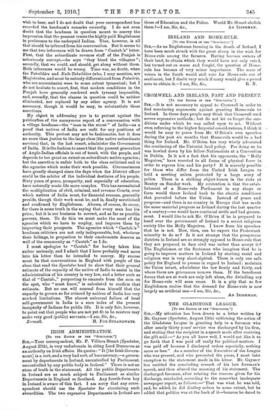CROMWELL AND IRELAND, PAST AND PRESENT.
[TO THY EDITOR Or THE " SPECTATOILl is not necessary to appeal to Cromwell in order to find convincing arguments against granting Home-rule to Ireland. In these days people may think that Cromwell used severe repressive methods ; but do not let us forget the con- ditions under which he was called upon to act. Without even referring to the higher-Imperial considerations, I think it would be easy to prove from Mr. O'Brien's own speeches during the past six months that Home-rule would be a bad thing for Ireland. Mr. O'Brien has very wisely advocated the continuing of the Unionist land policy. For doing so he was howled down by his fellow-Nationalists at a Convention in Dublin. Is it not a fact that his opponents, the "Molly Maguires," have resorted to all forms of physical force in order to repress him and his party ? It is scarcely possible for those who differ from the United Irish League to hold a meeting unless protected by a large army of police. There is a striking object-lesson in the riots at Bantry on Sunday week. My contention is that the estab- lishment of a Home-rule Parliament in any shape or form would throw Ireland back to the chaotic conditions that prevailed before the Union. Instead of peace and progress—and there is no country in Europe that has made the same material progress as Ireland during the last quarter of a century—we would have continual strife and bad govern- ment. I would like to ask Mr. O'Brien if he is prepared to hand over the government of Ireland to a secret religious society like the Molly Maguires. i know from his speeches that he is not. How, then, can he expect the Protestant minority to do so ? Is it not strange that the prosperous districts in Ireland are so strongly opposed to Home-rule that they are prepared to face civil war rather than accept it ? The Englishman or the Scotsman who imagines that he is going to improve matters in Ireland by starting racial and religious war is very short-sighted. There is only one safe policy for England to pursue in regard to Ireland: maintain the Union intact, administer the law firmly and fairly, and where there are grievances remove them. If the beneficent forces that are at work are only left alone, the dwindling cry for Home-rule will soon cease. It is a pity that so few Englishmen realise that the demand for Home-rule is now largely an artificial one.—I am, Sir, &c.,
AN IRISHMAN.










































 Previous page
Previous page